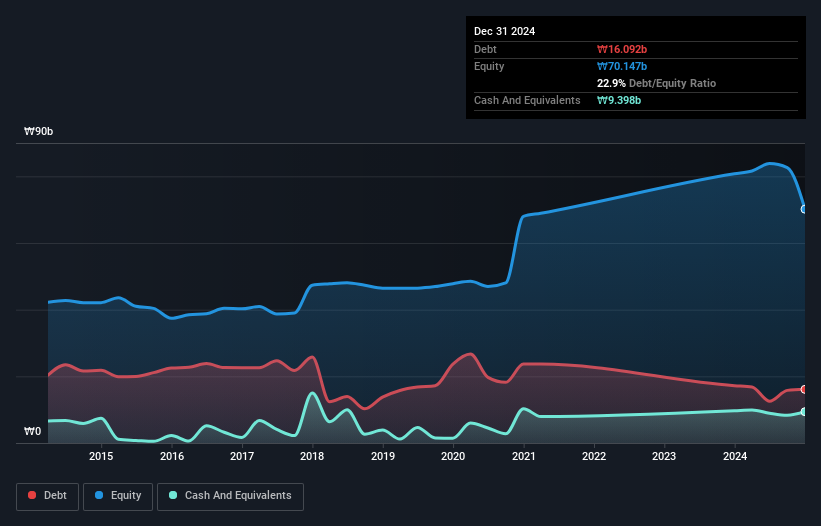- South Korea
- /
- Entertainment
- /
- KOSDAQ:A068050
Would Pan Entertainment (KOSDAQ:068050) Be Better Off With Less Debt?
Warren Buffett famously said, 'Volatility is far from synonymous with risk.' It's only natural to consider a company's balance sheet when you examine how risky it is, since debt is often involved when a business collapses. As with many other companies Pan Entertainment Co., Ltd. (KOSDAQ:068050) makes use of debt. But should shareholders be worried about its use of debt?
When Is Debt Dangerous?
Generally speaking, debt only becomes a real problem when a company can't easily pay it off, either by raising capital or with its own cash flow. If things get really bad, the lenders can take control of the business. However, a more usual (but still expensive) situation is where a company must dilute shareholders at a cheap share price simply to get debt under control. By replacing dilution, though, debt can be an extremely good tool for businesses that need capital to invest in growth at high rates of return. When we examine debt levels, we first consider both cash and debt levels, together.
What Is Pan Entertainment's Net Debt?
The image below, which you can click on for greater detail, shows that Pan Entertainment had debt of ₩16.1b at the end of December 2024, a reduction from ₩17.2b over a year. However, because it has a cash reserve of ₩9.40b, its net debt is less, at about ₩6.69b.

A Look At Pan Entertainment's Liabilities
According to the last reported balance sheet, Pan Entertainment had liabilities of ₩36.7b due within 12 months, and liabilities of ₩14.3b due beyond 12 months. Offsetting these obligations, it had cash of ₩9.40b as well as receivables valued at ₩6.24b due within 12 months. So its liabilities total ₩35.3b more than the combination of its cash and short-term receivables.
This deficit isn't so bad because Pan Entertainment is worth ₩74.5b, and thus could probably raise enough capital to shore up its balance sheet, if the need arose. However, it is still worthwhile taking a close look at its ability to pay off debt. When analysing debt levels, the balance sheet is the obvious place to start. But it is Pan Entertainment's earnings that will influence how the balance sheet holds up in the future. So when considering debt, it's definitely worth looking at the earnings trend. Click here for an interactive snapshot.
Check out our latest analysis for Pan Entertainment
Over 12 months, Pan Entertainment made a loss at the EBIT level, and saw its revenue drop to ₩35b, which is a fall of 72%. That makes us nervous, to say the least.
Caveat Emptor
Not only did Pan Entertainment's revenue slip over the last twelve months, but it also produced negative earnings before interest and tax (EBIT). To be specific the EBIT loss came in at ₩607m. When we look at that and recall the liabilities on its balance sheet, relative to cash, it seems unwise to us for the company to have any debt. Quite frankly we think the balance sheet is far from match-fit, although it could be improved with time. We would feel better if it turned its trailing twelve month loss of ₩3.1b into a profit. So we do think this stock is quite risky. The balance sheet is clearly the area to focus on when you are analysing debt. However, not all investment risk resides within the balance sheet - far from it. For instance, we've identified 2 warning signs for Pan Entertainment that you should be aware of.
If you're interested in investing in businesses that can grow profits without the burden of debt, then check out this free list of growing businesses that have net cash on the balance sheet.
New: Manage All Your Stock Portfolios in One Place
We've created the ultimate portfolio companion for stock investors, and it's free.
• Connect an unlimited number of Portfolios and see your total in one currency
• Be alerted to new Warning Signs or Risks via email or mobile
• Track the Fair Value of your stocks
Have feedback on this article? Concerned about the content? Get in touch with us directly. Alternatively, email editorial-team (at) simplywallst.com.
This article by Simply Wall St is general in nature. We provide commentary based on historical data and analyst forecasts only using an unbiased methodology and our articles are not intended to be financial advice. It does not constitute a recommendation to buy or sell any stock, and does not take account of your objectives, or your financial situation. We aim to bring you long-term focused analysis driven by fundamental data. Note that our analysis may not factor in the latest price-sensitive company announcements or qualitative material. Simply Wall St has no position in any stocks mentioned.
About KOSDAQ:A068050
Pan Entertainment
Engages in the entertainment business in South Korea and internationally.
Mediocre balance sheet with low risk.
Market Insights
Community Narratives




